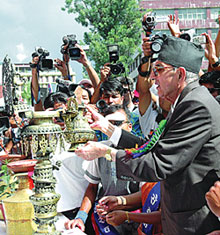|
|
Competitive firms know that if they fail to learn from their mistakes, they risk going out of business. Shouldn't the leaders of political parties-competing as they do for citizens' votes-similarly learn from their mistakes? They say that they are sorry and that they wish to play straight this time. But before the fire of Jana Andolan II cools off, it's worth unbundling what went wrong earlier.
No clean break. The fall of the Panchayat did not provide a sense of closure from what went on before. There was no tribunal. Nor was there any truth and reconciliation commission to judge the actions of that 30-year-old system's abusers. Instead, their sins got glossed over and most soon emerged on the national stage as born-again democrats. Looking back, this failure to enforce a clean break set in motion many actions that eventually tarred the practices of multi-party democracy as being no more than Panchayat Plural.
Bias against smaller parties. Small parties paid a heavy price for being, well, small. Initially, all took part in general elections. But since most did not collect enough votes they were made to forfeit deposits and give up election symbols. Such forced humiliations sidelined them and robbed the nation of diverse voices that had bubbled up from the grassroots. Meanwhile, the political process remained stuck on the platitudes of the three major parties. By 1996, one aggrieved small party had decided that enough was enough. Slinging a rifle, it trudged off into the jungles of Rolpa by denouncing multiparty democracy as "a system of selling dog meat by showing a goat's head".
Politburo-like central committees. The three big parties were not successful in containing internal fights for power. This was because they clung on to their respective party's politburo-like apparatus called the Central Working Committee (CWC), whose task was to enforce groupthink, conformity and loyalty and wield power by handing out election tickets. In doing so, it squashed intra-party challenges to the leadership. Ambitious insiders with different ideas had no choice but to leave the mother party to launch breakaway groups.
Politicised institutions. The problem of unemployment was so acute that every MP's only task was to find jobs for hundreds of party karyakarta. To that end, once he was in government, the MP worked hard to place his people in civil service and public enterprises. He also arm-twisted private firms to hire many more. His rivals did the same once they became ministers. By 2000, this practice's result was starkly visible: just about every state-funded institution in Nepal functioned not according to what the tax-paying citizens demanded but based on how the political winds blew.
Not enough economic reforms. If democracy is defined as "a regime whose benefits are distributed among large numbers of citizens", then economic reforms help parcel out those benefits by empowering investors and consumers. The fact that an unelected government could shut down communication systems and muzzle the press 15 years after Jana Andolan I showed that little had been done earlier to widen the reform process by making it easier to funnel foreign and domestic private money into businesses of all kinds. After all, the more the people invest their own money-in telecom or media or infrastructure, for instance-the less likely it is that they'll let any one authoritarian group walk in and do as it pleases.
To strengthen our multi-party democracy, let's hope that this time around we are able to start afresh by maintaining the independence of public institutions, by pushing for wider economic reforms and by being inclusive of smaller parties in the political space while making politicians accountable to voters and not to those Soviet-style CWCs.




